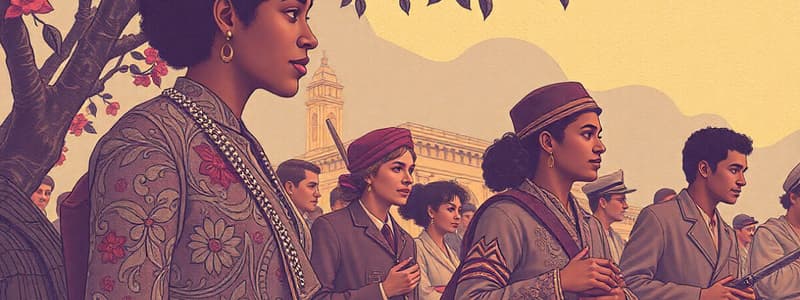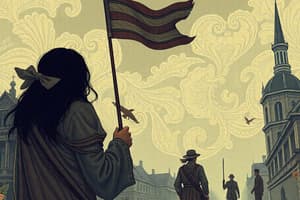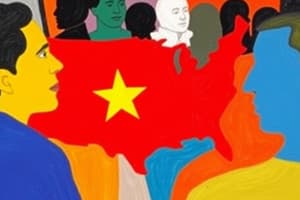Podcast
Questions and Answers
What key legislative achievement significantly advanced civil rights in the United States during the 1960s?
What key legislative achievement significantly advanced civil rights in the United States during the 1960s?
- The Economic Opportunity Act, aimed at alleviating poverty and promoting economic equality.
- The Voting Rights Act, ensuring universal suffrage regardless of race.
- The Civil Rights Act, prohibiting segregation in public spaces and employment. (correct)
- The Fair Housing Act, preventing discrimination in the sale or rental of housing.
How did the perception of the Vietnam War change as the conflict progressed, influencing public sentiment and protest movements?
How did the perception of the Vietnam War change as the conflict progressed, influencing public sentiment and protest movements?
- Televised drafts and returning soldiers' accounts fueled anti-war protests. (correct)
- Economic prosperity at home overshadowed concerns about the distant conflict.
- Government propaganda effectively suppressed dissent and maintained public morale.
- Increased troop deployments led to stronger public support for the war effort.
In what way did rock music contribute to the cultural shifts occurring in the 1960s?
In what way did rock music contribute to the cultural shifts occurring in the 1960s?
- It reinforced traditional values and discouraged dissent among the youth.
- It primarily focused on entertainment, avoiding social or political commentary.
- It was largely ignored by the younger generation, who preferred folk and classical music.
- It served as a platform for artists to voice grievances and advocate for change. (correct)
What factors contributed to the inequitable nature of the Vietnam War draft in its early stages?
What factors contributed to the inequitable nature of the Vietnam War draft in its early stages?
How did the implementation of a lottery system for the Vietnam War draft aim to address previous criticisms?
How did the implementation of a lottery system for the Vietnam War draft aim to address previous criticisms?
What characterized the period known as 'The Long Peace' following World War II?
What characterized the period known as 'The Long Peace' following World War II?
How did the Civil Rights Movement influence race and gender relations in America?
How did the Civil Rights Movement influence race and gender relations in America?
How would the genre of Rock music be viewed by older generations?
How would the genre of Rock music be viewed by older generations?
What role did leaders like Martin Luther King Jr. and Malcolm X play in the desegregation movement?
What role did leaders like Martin Luther King Jr. and Malcolm X play in the desegregation movement?
What implications did the Vietnam War have on the American perception of the government?
What implications did the Vietnam War have on the American perception of the government?
Flashcards
The Long Peace
The Long Peace
Period after WWII where the scale of conflict was smaller compared to previous wars.
Civil Rights Movement
Civil Rights Movement
Movement advocating for equal treatment and rights for Black people in the U.S.
Civil Rights Act of 1964
Civil Rights Act of 1964
Landmark legislation that outlawed segregation in public places and employment.
Vietnam War
Vietnam War
Signup and view all the flashcards
The Draft (Vietnam Era)
The Draft (Vietnam Era)
Signup and view all the flashcards
Rock and Roll in the 60s
Rock and Roll in the 60s
Signup and view all the flashcards
Study Notes
- Following World War II, the world experienced a period known as "The Long Peace," characterized by a reduction in the scale of conflicts.
- The post-war generation grew up in a comparatively peaceful environment, spared from the total war hardships endured by their parents.
- The 1960s in America were defined by the Civil Rights Movement, the Vietnam War, and the rise of rock n’ roll.
Civil Rights Movement
- The desegregation movement started in the Southern states, led by figures like Martin Luther King Jr. and Malcolm X, advocating for equal treatment of Black people.
- A significant victory was achieved in 1964 with the Civil Rights Act, which outlawed segregation in public schools and workplaces.
- This legislation had a lasting impact on race and gender relations in America.
Vietnam War
- In 1965, the U.S. deployed troops to Vietnam, citing the need to prevent the spread of communism.
- Initially, the draft disproportionately affected young men from poorer families, while college students and those from wealthier families were often exempt.
- The draft system was later changed to a more equitable lottery system where draftees were chosen at random and televised for all to see.
- Returning troops shared accounts which ignited widespread protests against U.S. involvement in the war.
Rock n’ Roll
- Rock music, which originated in the 1950s, gained mainstream popularity in the 1960s with bands like The Beatles and The Rolling Stones.
- Older generations viewed the new music as an immoral form of self-expression.
- Musicians became voices for the youth, expressing their grievances to society through their music, addressing inequality and suffering.
Cultural Shift
- The 1960s were turbulent but brought positive changes, including expanded rights for marginalized groups.
- The Vietnam War made Americans aware of potential government overreach and fallibility.
- Rock music served as a vehicle for expressing these social changes.
- The hippie generation emerged as a prominent element in American social consciousness.
- The 1970s would reveal the consequences of this social revolution.
Studying That Suits You
Use AI to generate personalized quizzes and flashcards to suit your learning preferences.




